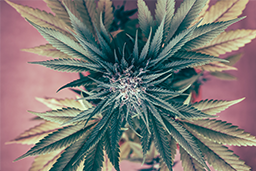Delta is very much in the news these days.
The delta variant continues to spread, bringing the total number of COVID-19 cases to 40 million since the start of the pandemic.
Delta Airlines made headlines when it recently announced that its unvaccinated employees will face $200 monthly increases on their health insurance premiums beginning November 1, citing steep costs to cover workers hospitalized with COVID.
And then there’s a delta having nothing to do with the novel coronavirus. Delta-8-tetrahydrocannabinol (THC) is a psychoactive compound naturally occurring in hemp and cannabis and believed by many to be legal at the federal level.
No doubt about it, momentum toward the federal legalization (or, at the very least, decriminalization) of cannabis is building, especially with the Cannabis Administration and Opportunity Act now pending in the U.S. Senate. That legislation would, among other things, remove marijuana from the Controlled Substances Act, introduce regulations to tax cannabis products, expunge prior convictions in some circumstances, and maintain the authority of states to set their own marijuana policies. Still, cannabis currently remains listed in the CSA as a Schedule I drug and is therefore against the federal law—this despite the rush of states making the substance legal for recreational and/or medical use—which begs the question: what exactly is delta-8 THC and is it actually a fully legal alternative to cannabis?
Delta-8 THC: A Brief Primer
THC is a mind-altering compound found in cannabis. The cannabis plant contains several different forms of THC (as well as other compounds like CBD), and not all of them are equal. Delta-9 TCH is the main psychoactive found in marijuana, and it’s the elevated concentrations of this compound that produces a “high” from the cannabis subject to the CSA.
Mostly synthesized from CBD extracted from hemp, delta-8 TCH, while similar to delta-9 THC, has a different chemical structure, making it a much milder alternative to its more potent cousin. Nonetheless, delta-8 THC is touted for producing modest feelings of euphoria, relaxation and potential pain relief.
The Question of Legality
To opine on the legality of delta-8 THC at the federal level, it’s first necessary to understand the difference between hemp and marijuana. Hemp is a cannabis plant that contains less than 0.3 percent delta-9 THC. Marijuana also comes from a cannabis plant but has a higher concentration of delta-9 TCH, more than 0.3 percent.
With that by way of background, the 2018 Farm Bill legalized hemp, which is non-intoxicating, though the legislation didn’t contemplate intoxicating levels of delta-8 THC (again, synthesized from hemp), essentially leaving the latter unregulated. Consequently, the law has created a loophole for products containing delta-8 THC (even in high amounts), so long as they are derived from federally legalized hemp containing less than 0.3 percent delta-9 THC. Indeed, by virtue of the Farm Bill, the manufacturing, distribution, sale and use of delta-8 THC in the form of gummies, vape cartridges, tinctures and the like is arguably permissible under federal law.
The key word is “arguably” because in passing the Farm Bill, Congress drew a line in the sand between marijuana, which produces a “high” and was clearly intended to remain illegal at the federal level, and hemp, which isn’t psychoactive and therefore now legal in the U.S. Clearly then, to the extent it produces a mind-altering effect—however mild—delta-8 THC violates the spirit of the law. Nonetheless, products containing delta-8 THC are being sold across the country without federal oversight.
The question of the legality gets even muddier since delta-8 doesn’t naturally occur in large amounts in hemp plants. The work around is to convert CBD or delta-9 THC into delta-8 THC synthetically, which is illegal.
States Are Weighing In
Several states have inserted themselves into the conversation about delta-8 THC—specifically, the absence of research regarding the compound’s psychoactive effects—by blocking its sale. In fact, the compound is banned or sales restricted in Alaska, Arizona, Arkansas, Colorado, Connecticut, Delaware, Idaho, Iowa, Kentucky, Michigan, Mississippi, Montana, New York, North Dakota, Rhode Island, Utah, Vermont and Washington.
Legal or not, calls to poison control centers nationwide are on the rise concerning the toxicity of delta-8 THC. The fact is that scientists still don’t know a lot about how the chemicals in the compound work, especially in high concentrations. Nonetheless, the consensus is that while delta-8 THC itself may not be dangerous, the worry is what it might be mixed with in a federally unregulated market.
Sellers (and Users) Beware
Delta-8-THC has found its way onto shelves in gas stations, convenience stores, tobacco shops and cannabis dispensaries from coast-to-coast—often with no age restrictions. With its ever-increasing popularity comes enhanced scrutiny, both in terms of legality and safety. And whether delta-8 is legal at the federal level may be something of an open question, those manufacturing, distributing and selling the substance must be mindful of the potential for litigation and civil exposure due to the lack of regulatory oversight, limited laboratory testing and the omnipresent possibility of product toxicity.
This blog post is not offered, and should not be relied on, as legal advice. You should consult an attorney for advice in specific situations.

